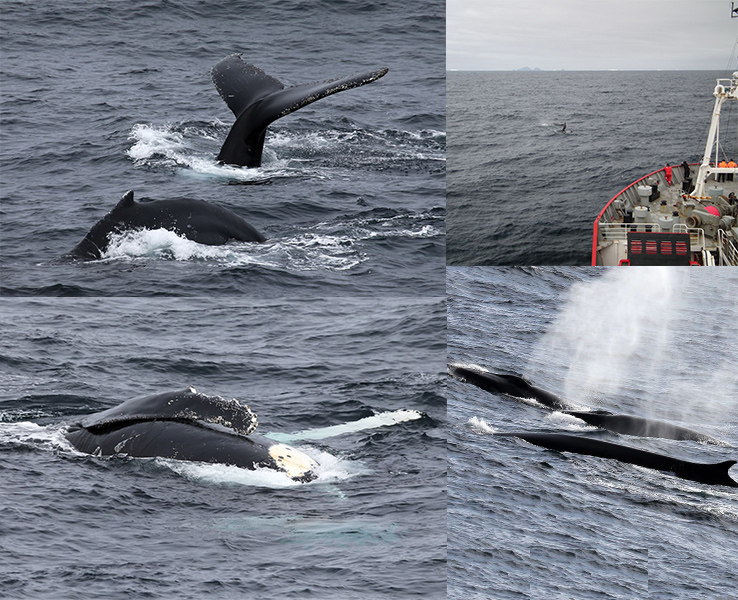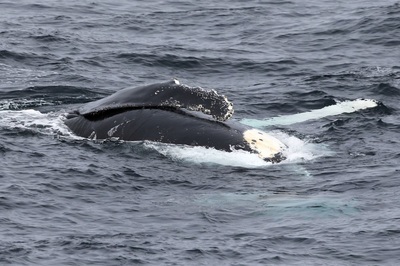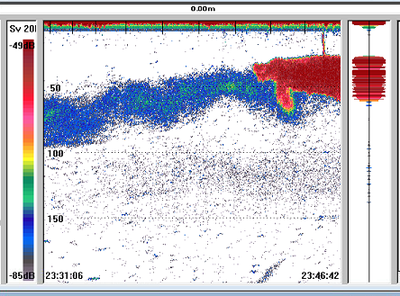|
José Xavier e José Seco Sono profundo . O navio baloiça suavemente para um lado...e para o outro. De repente, bem longe ouço algo estranho. “É o telefone?” questiono eu ainda sonolento. Acordo e compreendo que alguém me está a ligar. Será algo urgente? Passa-se alguma coisa importante? São 2 da tarde, o que significa que deverá ser algo MUITO importante pois o meu turno terminou às 6 da manhã e estive a trabalhar até às 9.30 da amanhã. Ou seja, estou ainda no primeiro sono. Era o Jon Watkins, o responsável da expedição científica. “José, tens de vir já à ponte do navio! São baleias, MUITAS baleias. Tens de vir cá ver isto!!!!” A excitação era grande na sua voz. Para alguém que já fez mais de 25 expedições científicas à Antártida, isto deverá ser extraordinário...e era!!! Estamos no meio do Oceano Antártico, longe de tudo e de todos, apenas perto das Ilhas Orcadas do Sul, cuja população deverá não passar de algumas mãos cheias de cientistas e suas equipas. Ali, bem no “fim do mundo” estávamos literalmente rodeados de baleias. MUITAS baleias. Eram maioritariamente Baleias comuns (Fin Whales) e Baleias de Bossa (Humpback Whales). Eram muitas em redor do navio. Deep sleep. The RRS James Clark Ross moves smoothly to one side...and then to the other. Suddenly, far away I hear something strange. “Is this the telephone?”, I wondered still half asleep. I wake up and understand that actually that is someone trying to call me. Would it be urgent? Something important? It is 2pm, which means that something REALLY IMPORTANT is going on as my work shift ended at 6am but had others things to do up to 9.30am. Therefore, everyone knew I was in my deep sleep. It was Jon Watkins, the Principal Scientific officer of the Expedition. “José, you must come to the bridge! There are whales, MANY whales. It is worth seeing this!”, said Jon excited. For someone that has made more than 25 Antarctic expeditions, it must be extraordinary...and it was! We were in the middle of the Southern Ocean, far away from everywhere, only close to the South Orkneys (~60 S 47 W), whose population does not reach a few hands of people (only scientists and their teams). Right here, literally in the “end of the World”, we were surrounded by so many whales. There were mainly Humpack and fin whales. There were numerous, some very close to the ship. Vários colegas já tinham passado muito tempo na proa do navio a tirar fotografias do que se estava a passar. Porquê ter de repente tantas baleias aqui? Seria curiosidade delas em relação ao navio? Olhámos para o sonar (equipamento que deteta o que se encontra debaixo de água, usando o som) e percebemos o porquê. Estávamos mesmo por cima de um cardume GIGANTE do camarão do Antártico Euphausia superba, com vários km de comprimento e de largura. As baleias estavam ali por causa do seu alimento! Various colleagues of ours spent considerable time at the bow of the ship taking photos. Why suddenly so many whales here? Were they curious about us? We looked at the Sonar (equipment that detects what is in the water, using sound) and understood why. We were right on the top of a massive Antarctic krill shoal that had km of length and width. Whales were there for their food! Foi incrível estar muito perto das baleias, que com certeza nunca viram um navio na sua vida. A nossa curiosidade e a delas devia ser semelhante. Nessa manhã, além das baleias, havia também muitos lobos marinhos e pinguins de barbicha em redor do nosso navio (além de aves voadoras que nos acompanham sempre: petreis do cabo, albatrozes de sobrancelha preta,...). Ali tivemos mais uma vez aquela sensação de que como estivéssemos num jardim zoológico , mas desta vez eram as baleias a olhar para nós...fantástico!
Após este encontro, com a descrição detalhada registada cientificamente pelos nossos colegas Noruegueses, ficou nevoeiro, o cardume acabou e deixámos de ver as baleias. E este episódio desvaneceu-se tão rapidamente como surgiu. Momentos depois, continuámos com a investigação e usámos uma rede mais pequena (RMT8) para apanhar algum camarão deste cardume, de modo a percebermos melhor quais as suas características (se continha camarão do Antártico ou também havia outras espécies, os seus tamanhos, as suas quantidades). Conclusão: as baleias sabem exatamente o que fazer, e num Oceano gigante, preferem ficar bem juntas do seu alimento. Se, no futuro, precisamos de encontrar o camarão do Antártico, é só procurar baleias. Estamos já entusiasmados com o nosso próximo passo: vamos recolher amostrar em zonas menos profundas e é bem possível que vamos encontrar espécies novas. Continua atento(a)! It was incredible being so close to these amazing animals. Their curiosity was the same as ours. This morning, other than whales, there were also Antarctic fur seals and chinstrap penguins (alnog with flying seabirds that has been with us all through the expedition: cape petrels, black-browed albatrosses...). Then, I had the feeling once again of being in a zoo, in which the animals were the one´s looking at us...fantastic! After this event, that got a full scientific description by our Norwegian colleagues, it got foggy, the Antarctic krill shoal stop showing in the sonar and we stopped seeing the whales. This episode disappeared almost as quickly as it started. A few moments later, we continued with our research work, and used a smaller net (RMT8) to assess the shaol we have seen in oder to understand its caracteristics (if only contained Antarctif krill or other species, its sizes, its quantities). Conclusion: Whales know exactly what to do in the middle of the Ocean, staying close to their food. How do they do that, it is still poorly understood. By the way, if we want to find Antarctic krill, just keep an eye for whales. Next stop: collecting samples on the shallower waters where we may find other species we have not found before. Stay tuned! Os comentários estão fechados.
|
BLOGS DAS CAMPANHAS
|



 Feed RSS
Feed RSS
